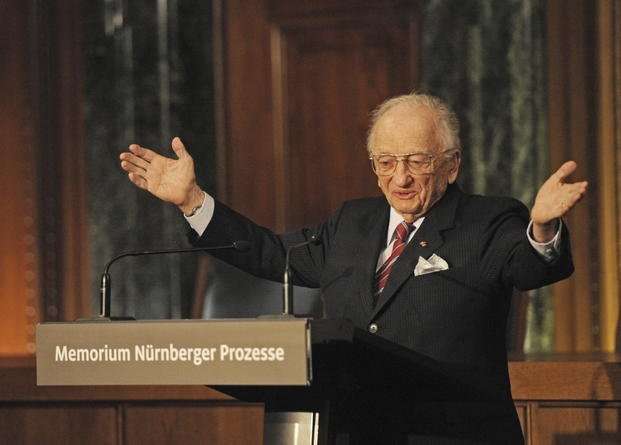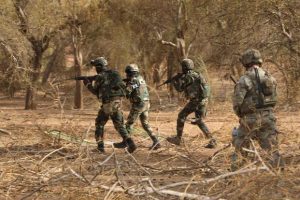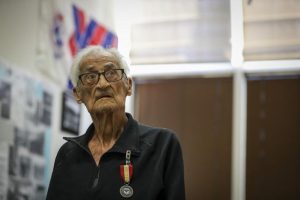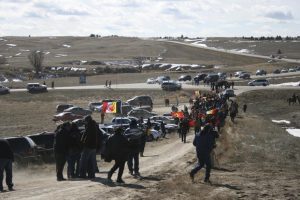In the spring of 1947, former Army sergeant and now Nuremberg prosecutor Ben Ferencz pleaded with his boss to add one more case to the docket before the International Military Tribunals set up to try Nazi war crimes shut down.
Army Brig. Gen. Telford Taylor, who had succeeded Associate Supreme Court Justice Robert Jackson as chief prosecutor for the tribunals, told Ferencz that the Pentagon would not fund another trial. The push was on to wrap up the existing cases and be done, turning attention to the emerging Cold War with the Soviet Union.
“I got rather indignant,” Ferencz later recalled in a 2021 Duke University Law School interview, “and I said, ‘You can’t let these bastards go. You just can’t walk away and say, ‘I can’t do it.'”
The bastards in question were leaders of the Einsatzgruppen, meaning “deployment group” or “action group.” These were mobile units that followed the advance of German forces and were assigned “special tasks” to kill every Jew, Communist and Roma they could find, according to the U.S. Holocaust Museum.
Taylor relented and asked whether Ferencz could prosecute the case himself “in addition to your other duties. So I said, ‘Sure,’ and he said, ‘OK, you do it.'”
Twenty-two of the defendants were found guilty of war crimes, and Ferencz, who died at age 103 on April 7 in Boynton Beach, Florida, had found a lifelong and intrepid commitment to advocating for peace through international law. His motto was “law not war,” and in books, countless interviews and on his own website, he pressed to replace “the rule of force with the rule of law.”
Sixty-three years after he won convictions in the Einsatzgruppen case, Ferencz was called upon to give closing remarks at the Hague in the first trial put on by the International Criminal Court in 2011 against Congolese warlord Thomas Lubanga Dyilo, who was charged with recruiting child soldiers and training them to kill.
Ferencz outlined the case: evidence showing hundreds of children under the age of 15 being trained for war in 20 different camps.
“Words and figures cannot adequately portray the physical and psychological harm inflicted on vulnerable children who were brutalized and who lived in constant fear,” he said. “The case we present is a plea of humanity to law. It was a call for human beings to behave in a humane and lawful way.”
The invitation to address the court was in recognition of Ferencz’ long advocacy for the creation of the ICC, which again put him at odds with the U.S. government. In the obits and many tributes to his passing, Ferencz’s opposition to U.S. policies that he felt detracted from the ultimate goal of peace was often overlooked.
“I’m an American patriot,” he would say, but he questioned American involvement in Vietnam, Iraq and Afghanistan, and was adamant in criticizing the U.S. refusal to become a party to the International Criminal Court.
Under President Bill Clinton, the U.S. had endorsed the Rome Statute international agreement that established the ICC, which was designed to bring individuals to justice, filling a gap in international law.
Clinton never submitted the treaty to the Senate for ratification as required; then, under President George W. Bush, Congress passed the American Service Members Protection Act stating that troops “should be free from the risk of prosecution by the International Criminal Court, especially when they are stationed or deployed around the world to protect the vital interests of the United States.”
Ferencz was deeply critical of U.S. reticence to join in upholding international law.
“I have not forgotten that it took the United States 50 years to ratify the Genocide Convention, which we sponsored,” he said during a 2018 speech. “The world didn’t wait for the United States.”
“Of course, he was disappointed. He wanted the U.S. to take the lead” in support of the ICC, St. John’s University law professor John Q. Barrett, a biographer of Justice Jackson and a long-time friend of Ferencz, said in an interview with Military.com. “But he had the long view; he knew that none of this stuff was simple. You keep going. He was indefatigable, a bundle of energy. … He always said, ‘Never give up, never give up.’ It just meant that there was more to do tomorrow.”
Barrett called Ferencz “humanity’s lawyer.”
“Ben just really believed in the law,” he said. “He was really an idealist, a believer. He never really wavered from that fundamental belief: This is our tool, build law, use law, deter with law and improve the planet.”
Ferencz’ son, Don Ferencz, told Military.com that his father could be something of a “wisecracker,” which served him well in his many challenges to authority and helped convince Taylor that he was the right lawyer to go after the Einsatzgruppen.
In his interview for the prosecutor’s job, Ferencz said Taylor told him, “I’ve been checking up on your record, but I’m concerned because you’re occasionally insubordinate,” Ferencz recounted in 2018 to the “Criminal” true crime podcast.
“And I said, ‘No, that’s not correct, I’m not occasionally insubordinate, I’m usually insubordinate. I never obey an order which I know is stupid or illegal.’ And I said, ‘Well, I’ve been checking up on you, too. I don’t think you’ll give me that kind of order.'” He said, ‘You’ll go with me.'”
Don Ferencz said his father had seen the death camps and the crematoria and said that he had “peered into hell. I think that’s what drove him.”
There is no birth certificate, but Berrell Ferencz was believed to have been born around March 11, 1920, in Transylvania, which was then part of Romania, and was brought as a baby to the U.S., where he became Benjamin.
The family initially settled in the tough section of mid-Manhattan’s West Side known as “Hell’s Kitchen.” He spoke only Yiddish at first but did well enough in grade school that he was accepted at the demanding Townsend Harris High School, which had a three-year curriculum and a guaranteed entry for graduates to City College.
The remarkable list of Townsend Harris alumni included Supreme Court Justice Felix Frankfurter; Jonas Salk, who developed one of the first successful polio vaccines; lyricist Ira Gershwin, brother of composer George Gershwin;, and Yip Harburg, who did the score for 1939 movie “The Wizard of Oz.”
At City College, Ferencz earned a scholarship to Harvard Law School, where he served as a research assistant to professor and criminologist Sheldon Glueck, who assigned him to read every book he could find in the Harvard Law Library on war crimes and international law.
After Harvard, he enlisted in the Army and deployed to England with the 115th Anti-Aircraft Artillery Battalion. The unit came ashore in Normandy some weeks after the D-Day invasion and later was active in the Battle of the Bulge. But in December 1944, Ferencz was pulled from the 115th AAA and assigned to the Judge Advocate General’s Corps of the Third Army, commanded by Gen. George S. Patton.
French magistrate Olivier Beauvallet, who worked on the French edition of Ferencz’ autobiography, wrote that Ferencz “was one of the first investigators working on war crimes, even as the war was still raging. His first investigations concerned the lynching of Allied pilots,” and he then participated in the liberation of the death camps at Ohrdruf and Buchenwald.
Citing his authorization by Patton, Ferencz also went to the camps at Flossenburg, Mauthausen, Ebensee and Dachau, where he would seize the death registers of the names of the prisoners and the false causes of their deaths, Beauvallet wrote.
But with the war’s end, Ferencz was discharged from the Army and was back in New York in December 1945 and looking for work. That was when he was contacted by Taylor, who convinced him to return to Germany as a lead investigator.
Ferencz pressed Taylor to add the case against 22 of the Einsatzgruppen leaders after a Swiss researcher working for him made a stunning find in an annex of the German Foreign Office of the complete and detailed reports of the daily activities of the roaming death squads, including 34,000 killed over two days in the Kyiv ravine called Babi Yar.
Ferencz later recounted how he got out a calculator to go through the reports and stopped when he reached a total of one million dead. He was 27 years old and had never tried a case before, but he devised a strategy of simply presenting the documentary evidence in what The Associated Press would describe as the “biggest murder trial in history.”
Ferencz would later write, “I was keenly aware that there was no way for the scales of justice to balance the murder of more than a million innocent human beings” against the lives of the defendants, but “it was my hope that the trial would serve a more useful and enduring purpose — that it might somehow help to deter the repetition of such horrors in the future.”
Ferencz never called a witness and instead simply presented the documentary evidence over the course of two days. His son, Don Ferencz, said witnesses weren’t necessary since the documents “amounted to signed confessions from all the defendants — a prosecutor’s dream.”
In his opening statement to the tribunal, Ferencz urged the judges to look beyond the brutality of the case at hand to endorse the right of each individual to live free of fear and with dignity under international law.
At 5-foot-2, Ferencz barely cleared the lectern to address the court at Nuremberg’s Palace of Justice. But he began in a steady voice: “May it please your honors, it is with sorrow and with hope that we here disclose the deliberate slaughter of more than a million innocent and defenseless men, women and children.
“This was the tragic fulfillment of a program of intolerance and arrogance. Vengeance is not our goal, nor do we seek merely a just retribution,” he said, but “we ask this court to affirm by international penal action man’s right to live in peace and dignity regardless of his race or creed. The case we present is a plea of humanity to law.”
All 22 defendants, including six generals, were convicted of war crimes and crimes against humanity, and 13 were sentenced to death. Four were eventually executed.
Don Ferencz said that his father went about his work with little thought of what history might say. “I don’t think personal legacy is important to him,” the son said. “I think what’s important to him is that we advance the rule of law, advance the ball for all humankind to diminish suffering.”
“I’m still in there fighting,” Ferencz told “60 Minutes” in a 2017 interview. “And you know what keeps me going? I know I’m right.”
— Richard Sisk can be reached at Richard.Sisk@Military.com.
Please rate this CIBA article
Vote






